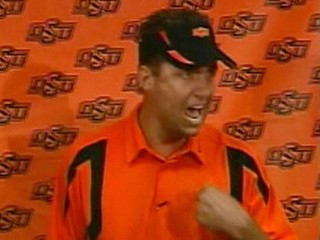There used to be a time in Sports when the post game press conference meant something. The coach or manager would trudge to the podium to atone for his team’s sins. And if a pesky journalist asked a question that the manager were not in the mood for, he would let the reporter hear about it in an expletive ridden tirade.
Apparently those days are behind us.
No more Dennis Green flipping out because the Chicago Bears were who he thought they were. Long gone are the days when Jim Mora yelled the answer a question about the playoffs. Mike Gundy will no longer challenge a reporter on the grounds that he was a man. And Lee Elia, the man who turned the entire Cubs fan base against him, would be blackballed from baseball today.
Because the post game tirade is an endangered species on the verge of going extinct.
The post game tirade has been the reason people who are not watching the presser because of work bother to tune in at all. Every one of these men created a story that overshadowed their respective games in less than ten minutes. The ranting and raving showed a human side to the men behind the podium. They gave us the illusion that they cared about the loss as much as the fans who buy their team's jerseys.
Sure Pat Knight at Lamar had a moment in which the nostalgia of tirades came back. Knight lambasted his seniors for their unsatisfactory work ethic. It did lack the volume of Gundy's rant, and the profanities of Elia's tirade. Knight shared the disappointment of his school's fans and boosters had after that loss, and it was nice to see that the pulse of the post game tirade can still be felt by the media and fans alike.
Unfortunately, the same men who passionately yell on the sidelines during the games are reduced to clichés and one sentence answers after it. Everyone who knows these coaches, or even watch their games casually know that when they take questions, are putting up walls. If the coaches behind the podiums were the same men who led their teams on the field, they would not have been hired.
The vanishing act of the post game tirade can be directly linked to the ever growing business culture that is devouring sports at an alarming rate.
Every coach and manager has been trained to say all the 'right things' to the media. Coaches do not want to be responsible for costing their team money by saying something that would result in a large fine. The men who sign all the paychecks do not want their employees to say anything that would jeopardize the public relations of their businesses.
That logic is rational on Wall Street, yet this business type attitude being programmed into the minds of the coaches after the game hurts the game itself.
Yes the owners rely on these coaches to make their brand look presentable. And yes the coaches saying anything discriminatory prejudice, or blatantly ignorant would harm their employers. But the people who truly care about what these coaches have to say are wearing team attire instead of business suits.
Individuals who go to sporting events want to know that they are getting some kind of return on their investment. The fans who don jerseys want to know that the players and coaches on their favorite teams experience the same feelings of agony in defeat.
The lack of coaches and managers getting upset in front of the cameras saps the human side of sports that make it watchable. If the line that separates entertainment and business gets erased, then sports will become sport. And the only people who enjoy sport are the elitists who probably own the teams.
The post game tirade is not just about watching coaches flip out after a tough loss, or the subsequent ability to make hilarious musical remixes of the tirade on Youtube. A coach or manager loosing his cool for a moment reminds everyone who watches sports that the men in charge care about the outcome too.
And if these businessmen who own teams can't understand that, then their clientele will look elsewhere for both business and entertainment.
